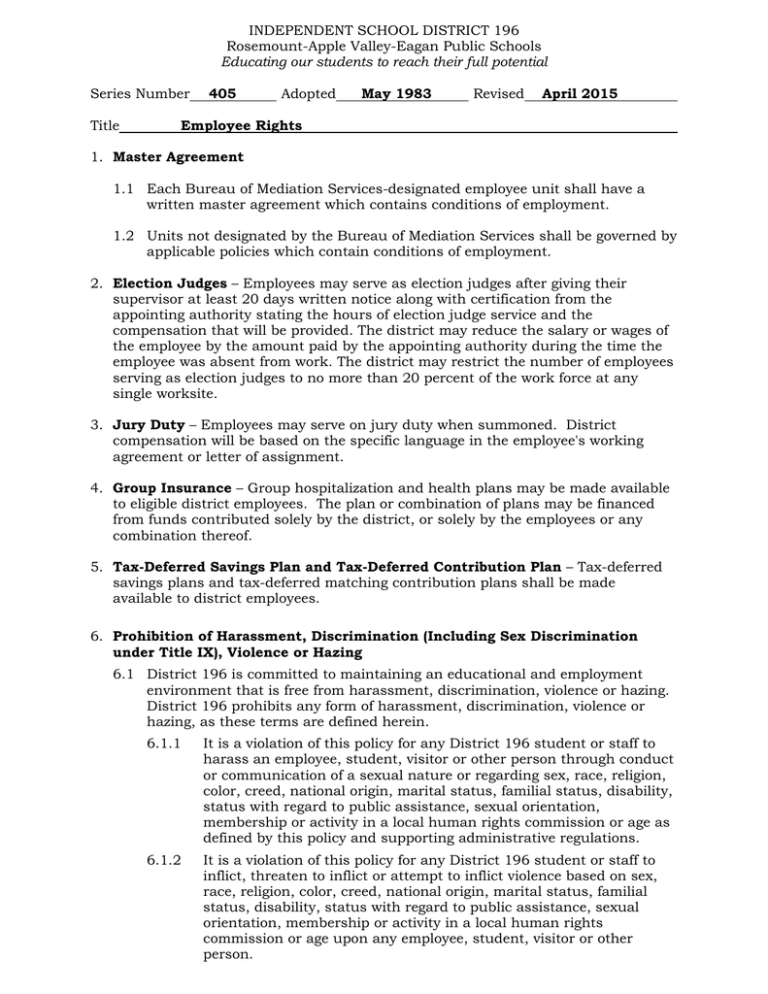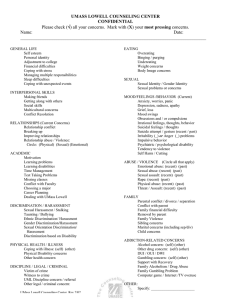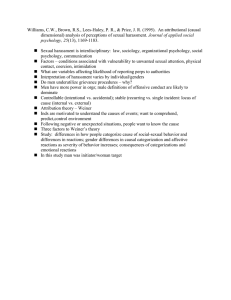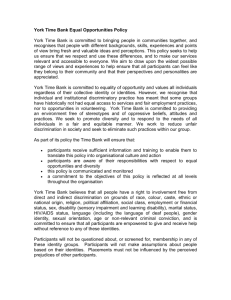
INDEPENDENT SCHOOL DISTRICT 196
Rosemount-Apple Valley-Eagan Public Schools
Educating our students to reach their full potential
Series Number
Title
405
Adopted
May 1983
Revised
April 2015
Employee Rights
1. Master Agreement
1.1 Each Bureau of Mediation Services-designated employee unit shall have a
written master agreement which contains conditions of employment.
1.2 Units not designated by the Bureau of Mediation Services shall be governed by
applicable policies which contain conditions of employment.
2. Election Judges – Employees may serve as election judges after giving their
supervisor at least 20 days written notice along with certification from the
appointing authority stating the hours of election judge service and the
compensation that will be provided. The district may reduce the salary or wages of
the employee by the amount paid by the appointing authority during the time the
employee was absent from work. The district may restrict the number of employees
serving as election judges to no more than 20 percent of the work force at any
single worksite.
3. Jury Duty – Employees may serve on jury duty when summoned. District
compensation will be based on the specific language in the employee's working
agreement or letter of assignment.
4. Group Insurance – Group hospitalization and health plans may be made available
to eligible district employees. The plan or combination of plans may be financed
from funds contributed solely by the district, or solely by the employees or any
combination thereof.
5. Tax-Deferred Savings Plan and Tax-Deferred Contribution Plan – Tax-deferred
savings plans and tax-deferred matching contribution plans shall be made
available to district employees.
6. Prohibition of Harassment, Discrimination (Including Sex Discrimination
under Title IX), Violence or Hazing
6.1 District 196 is committed to maintaining an educational and employment
environment that is free from harassment, discrimination, violence or hazing.
District 196 prohibits any form of harassment, discrimination, violence or
hazing, as these terms are defined herein.
6.1.1
It is a violation of this policy for any District 196 student or staff to
harass an employee, student, visitor or other person through conduct
or communication of a sexual nature or regarding sex, race, religion,
color, creed, national origin, marital status, familial status, disability,
status with regard to public assistance, sexual orientation,
membership or activity in a local human rights commission or age as
defined by this policy and supporting administrative regulations.
6.1.2
It is a violation of this policy for any District 196 student or staff to
inflict, threaten to inflict or attempt to inflict violence based on sex,
race, religion, color, creed, national origin, marital status, familial
status, disability, status with regard to public assistance, sexual
orientation, membership or activity in a local human rights
commission or age upon any employee, student, visitor or other
person.
Policy 405
Page 2
6.1.3
It shall be a violation of this policy for any District 196 student or
staff to plan, direct, encourage, aid or engage in hazing. It will also be
a violation of this policy for any staff to condone or fail to report any
hazing.
6.1.4
It shall be a violation of this policy for any District 196 student or
staff to engage in discrimination based on sex, race, religion, color,
creed, national origin, marital status, familial status, disability, status
with regard to public assistance, sexual orientation, membership or
activity in a local human rights commission or age upon any
employee, student, visitor or other person.
6.1.4.1
District 196 shall comply with state and federal laws
prohibiting discrimination, including Title IX of the
Educational Amendments of 1972, Title VI of the Civil
Rights Act of 1964, the Age Discrimination Act of 1975,
Section 504 of the Rehabilitation Act of 1973, the
Americans with Disabilities Act of 1991 and the
Minnesota Human Rights Act.
6.1.4.2
No person protected by these laws shall, on the grounds
of race, color, creed, religion, national origin, sex, marital
status, familial status, disability, status with regard to
public assistance, sexual orientation, membership or
activity in a local human rights commission or age be
excluded from participation in, be denied the benefits of or
be otherwise subjected to discrimination in employment
or under any educational program or activity operated by
the district.
6.1.4.3
The school district complies with a number of state and
federal laws prohibiting discrimination. Copies of these laws
are available for no charge in each district building and on
the district website.
6.1.5
The district will act to investigate all complaints, either formal or
informal, verbal or written, of harassment, discrimination, violence or
hazing, and to discipline or take appropriate action against any
employee, student or other district personnel who is found to have
violated this policy.
6.1.6
District 196 has written procedures for reporting and investigating all
complaints of harassment, discrimination, violence or hazing, which
provide for appropriate disciplinary action based on results of the
investigation and shall communicate these procedures to district
personnel and students. The district has appointed the Title IX
Coordinator/Human Rights Officers who are charged with receiving,
investigating and working to remedy complaints of harassment,
discrimination, violence or hazing. Among other things, they are
responsible for coordinating the district’s compliance with applicable
discrimination laws, which includes overseeing Title IX complaints
relating to sex discrimination and identifying and addressing any
problems that arise during the review of such complaints.
6.1.6.1
Specifically, the following persons are appointed as Title
IX Coordinators/Human Rights Officers and serve as both
the district’s Title IX Coordinator, as well as its Human
Rights Officers for complaints as follows:
Policy 405
Page 3
6.1.6.1.1 For complaints involving harassment,
discrimination, violence or hazing by district
personnel contact:
Director of Human Resources
3455 153rd Street West
Rosemount, MN 55068-4946
651-423-7859
6.1.6.1.2 For complaints involving harassment,
discrimination, violence or hazing by a student,
contact the appropriate level director:
Director of Elementary Education (grades k-5)
3455 153rd Street West
Rosemount, MN 55068-4946
651-423-7782
or
Director of Secondary Education (grades 6-12)
3455 153rd Street West
Rosemount, MN 55068-4946
651-423-7712
6.1.7
6.1.6.2
A complaint made to one Title IX Coordinator/Human
Rights Officer that falls within the province of another
Title IX Coordinator/Human Rights Officer, shall be
forwarded to the appropriate Title IX Coordinator/Human
Rights Officer.
6.1.6.3
When appropriate, in fulfilling their duties, the Title IX
Coordinator/Human Rights Officers may delegate
investigational and other responsibilities to employees or
agents of the district.
6.1.6.4
Inquiries concerning the application of Title IX may be
referred to the appropriate Title IX Coordinator/Human
Rights Officer or to the Office of Civil Rights, which may
be reached at 1-800-421-3481 or ocr@ed.gov.
The superintendent develops and implements programs and
processes to:
6.1.7.1
Assure district compliance in employment or educational
programs, athletics, counseling, activities and facilities;
6.1.7.2
Evaluate district operations in terms of applicable federal
and state laws prohibiting discrimination, harassment,
violence and hazing;
6.1.7.3
Set up a Title IX grievance process and appoint the
district Title IX Coordinator/Human Resource Officers,
and
6.1.7.4
Set up a Section 504 grievance process, and appoint a
Section 504 grievance officer.
Policy 405
Page 4
6.1.8
Employees and students are responsible for reporting any evidence of
discrimination, harassment, violence or hazing on the basis of race,
color, creed, religion, national origin, sex, marital status, familial status,
disability, status with regard to public assistance, sexual orientation,
membership or activity in a local human rights commission or age in the
district. The district has developed regulations appointing appropriate
staff persons to whom reports shall be made. Appropriate action may be
taken against all who fail to report instances of discrimination,
harassment, violence or hazing.
6.1.9
This policy does not deny the right of any individual to pursue other
avenues of recourse which may include filing charges with the
Minnesota Department of Human Rights, initiating civil action or
seeking redress under state criminal statutes and/or federal law.
6.1.10 Nothing in this policy shall preclude teaching about issues related to
sex, race, religion, color, creed, national origin, marital status,
familial status, disability, status with regard to public assistance,
sexual orientation or age issues as part of the school curriculum.
6.1.11 Retaliation - The district shall discipline or take appropriate action
against any student or district personnel who retaliates against any
person who reports alleged harassment, discrimination, violence or
hazing, or against any person who testifies, participates in or assists
in an investigation, or who testifies, assists or participates in a
proceeding or hearing relating to such harassment, discrimination,
violence or hazing. Retaliation includes, but is not limited to, any
form of intimidation, reprisal or harassment.
6.1.12 All persons in the district affected by this policy shall be notified about
this policy.
6.2 Definitions
6.2.1
Sexual Harassment – Sexual harassment is a form of sex
discrimination and includes unwelcome sexual advances, requests for
sexual favors, sexually-motivated physical conduct, other verbal or
physical conduct or communication of a sexual nature, including
communication accomplished through the use of technology,
including sexting and some forms of cyberbullying when (a)
submission to that conduct or communication is made a term or
condition, explicitly or implicitly, of employment, public services or
education; or (b) submission to or rejection of that conduct or
communication by an individual is used as a factor in decisions
affecting that individual’s employment, public services or education;
or (c) that conduct or communication has the purpose or effect of
substantially interfering with an individual’s employment, public
services or education, or creating an intimidating, hostile or offensive
employment, public services or educational environment.
6.2.1.1
In compliance with 6.2.1 above, while sexual harassment
encompasses a wide range of conduct, some examples of
conduct which may be prohibited include:
6.2.1.1.1
Promising, directly or indirectly, a reward, if
the student or employee complies with a
sexually oriented request;
Policy 405
Page 5
6.2.1.1.2
Threatening, directly or indirectly, retaliation
if the student or employee refuses to comply
with a sexually oriented request;
6.2.1.1.3
Denying, directly or indirectly, an employment
or education-related opportunity, if the
student or employee refuses to comply with a
sexually oriented request;
6.2.1.1.4
Engaging in unwelcome sexually suggestive
conversation, physical contact or touching of
another student or employee;
6.2.1.1.5
Sexual exploitation and sexually based
stalking and/or bullying;
6.2.1.1.6
Displaying and sharing pornographic or
sexually oriented materials;
6.2.1.1.7
Engaging in indecent exposure;
6.2.1.1.8
Making unwelcome sexual or romantic
advances toward a student or employee and
persisting despite the student or employee’s
rejection of the advances, or
6.2.1.1.9
Sexual misconduct, which is any nonconsensual physical contact of a sexual
nature. It may include any intentional sexual
touching, however slight, without consent.
6.2.1.2
Sexual harassment can be physical and/or psychological
in nature. An aggregation of a series of incidents can
constitute sexual harassment even if one of the incidents
considered separately would not rise to the level of
harassment.
6.2.1.3
Sexual harassment can involve males and females being
harassed by members of either sex. Although sexual
harassment sometimes involves a person in a greater
position of authority as the harasser, individuals in
positions of lesser or equal authority also can be found
responsible for engaging in prohibited harassment.
6.2.2
Sexual violence is a physical act of aggression or force or threat of
aggression which involves the touching of another person’s intimate
parts, or forcing a person to touch any person’s intimate parts.
6.2.3
Harassment and Violence based on sex, race, religion, color, creed,
national origin, marital status, familial status, disability, status with
regard to public assistance, sexual orientation, membership or
activity in a local human rights commission or age:
6.2.3.1
Harassment consists of physical or verbal conduct or
communication, including electronic communication that is
demeaning or hostile to an individual’s status related to one
or more of the categories listed in section 6.2.3 above when:
Policy 405
Page 6
6.2.3.2
6.2.3.1.1
Submission to that conduct or communication
is made a term or condition, explicitly or
implicitly, of employment, public services or
education, or
6.2.3.1.2
Submission to or rejection of that conduct or
communication by an individual is used as a
factor in decisions affecting that individual's
employment, public services or education, or
6.2.3.1.3
That conduct or communication has the
purpose or effect of substantially interfering
with an individual's employment, public
services or education, or creating an
intimidating, hostile or offensive employment,
public services or educational environment.
Violence is a physical act of aggression or assault upon
another because of, or in a manner reasonably related to,
an individual's status in relation to one or more of the
categories listed in section 6.2.3 above.
6.2.4
Hazing – Hazing means committing an act against a student, or
coercing a student into committing an act, that creates a substantial
risk of harm to a person in order for the student to be initiated into or
affiliated with a student organization. Hazing may occur on or off
school property and during or outside of school hours.
6.2.5
Discrimination – Discrimination means to segregate or separate on
the basis of an individual’s sex, race, religion, color, creed, national
origin, marital status, familial status, disability, status with regard to
public assistance, sexual orientation, membership or activity in a
local human rights commission or age, except where authorized by
law.
7. Travel – The district supports the professional growth of its employees and board
members, and appreciates the potential value to the individual and the district of
appropriate attendance at conferences, workshops and other meetings available
outside the district. At the same time, every possible effort must be made to
ensure that such travel enhances the mission and goals of the district and has a
positive effect on the quality of the educational program.
7.1 Travel of district employees and board members is limited to the purposes of
performing one’s duties, representing the district, improving the learning
environment, professional growth and contributing to the achievement of
district goals.
7.2 Travel arrangements for district employees and board members will be made
in accordance with guidelines in Administrative Regulation 405.8AR, Travel
and Related Expenses.
8. Wage Disclosure Protection Notice – In accordance with Minnesota Statute
181.172, employees are entitled to certain wage disclosure protections, by which
the district shall abide.
Policy 405
Page 7
References: Policies/405/04-27-15
Minnesota Statute 121A.03, Model policy on sexual, religious, and
racial harassment and violence
Minnesota Statute 121A.031, School student bullying policy
Minnesota Statute 121A.69, subdivision 2, Hazing
Minnesota Statute 181.172, Wage disclosure protection
Minnesota Statute 204B.195, Time off from work to serve as an
election judge
Minnesota Statute 363A, Minnesota Human Rights Act
Minnesota Statute 471.6161, Group Insurance
Minnesota Statute 471.661, Out of state travel
Minnesota Statute 593.50, Protection of Jurors’ Employment
Minnesota Statutes 609.321-609.324, Prostitution
Minnesota Statutes 609.341-609.345, Definitions
Minnesota Statute 626.556, Reporting of Maltreatment of Minors
Title VI of the Civil Rights Act of 1964
Age Discrimination Act of 1975
Section 504 of the Rehabilitation Act of 1973
20 U.S.C. 1681 et seq (Title IX of the Educational Amendments of
1972)
42 U.S.C. 2000e et seq (Title VI and VII of the Civil Rights Act)
42 U.S.C. 12101 et seq (Americans with Disabilities Act of 1991)
29 U.S.C. 621 et seq (Age Discrimination in Employment Act of 1967)





